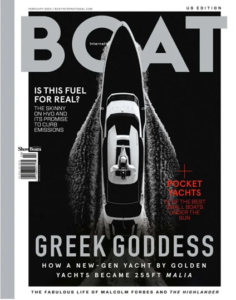As you may know, we own a fairly large boat and that is why I get magazines like BOAT where the focus is on really large boats … superyachts. These are absurd floating palaces and most of them are rented for a week or more rather than owned by individuals for their own use.
Well, perhaps not surprisingly, these fuel guzzlers are targets for environmentalists and energy stewards. So, it was interesting to me that the focus on energy sustainability has made its impact on this segment of the world economy. They are looking seriously at the ways they can be green. After all, they must clean up their image if for no other reason than to let their users feel OK about using them.
This month’s issue of BOAT had a feature article about HVO: Hydrotreated Vegetable Oil. This is deemed better than FAME: Fatty Acid Methyl Ester … aka biodiesel. The way it is made to be environmentally acceptable is by reclaiming deep fat fryer waste oil.
Some of you will jump to the conclusion that this is truly ridiculous because the scale of waste oil availability plus the disperse collection and processing logistics are absurd. We have enough proof that even recycling paper and plastics has proven difficult with less than 10% being recycled. But let’s dismiss our sense of practical reality and do some math.
The amount of canola oil (the most common oil used in deep fat fryers) annually is approaching 2000 million pounds which is about 0.71 million gallons per day. Let’s assume we recycled all of that. After all, that sounds like a big number.
The oil production in the world is about 80 million barrels per day … or about 3,200 million gallons per day. So, if all the canola oil used in the world were recycled into HVO it wouldn’t change the number. It simply doesn’t matter a bit.
Should all superyachts be sail powered? Ironically, that wouldn’t change much since sailing yachts use a lot of the fuel to produce power when anchored. Plus, something most people don’t know … sailboats often have to use diesel engines because the wind is not there or would make the passage difficult.
The obvious question no one wants to ask or answer is why are we using these vessels in the first place? Once we answer that, the optimization of world resources can commence.
